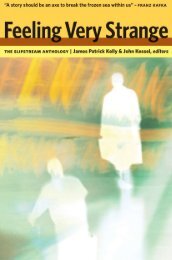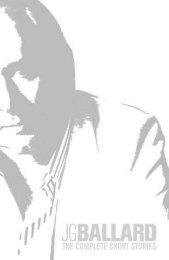The Curse of the Wer.. - Site de Thomas - Free
The Curse of the Wer.. - Site de Thomas - Free
The Curse of the Wer.. - Site de Thomas - Free
Create successful ePaper yourself
Turn your PDF publications into a flip-book with our unique Google optimized e-Paper software.
NOTES<br />
Howard (Cleveland and London: <strong>The</strong> Press <strong>of</strong> Case Western Reserve University,<br />
1973); Gary Wolfe, ‘Symbolic Fantasy’, Genre (1975), pp. 194–209;<br />
Colin N. Manlove, Mo<strong>de</strong>rn Fantasy: Five Studies (Cambridge: Cambridge<br />
University Press, 1975); W.R. Irwin, <strong>The</strong> Game <strong>of</strong> <strong>the</strong> Impossible: A Rhetoric<br />
<strong>of</strong> Fantasy (Urbana: University <strong>of</strong> Illinois Press, 1976); Eric S. Rabkin,<br />
<strong>The</strong> Fantastic in Literature (Princeton: Princeton University Press, 1976);<br />
Stephen Prickett, Victorian Fantasy (Bloomington and London: Indiana<br />
University Press, 1979).<br />
16. Manlove, Mo<strong>de</strong>rn Fantasy, p. 260.<br />
17. In 1979, <strong>the</strong> First International Conference on <strong>the</strong> Fantastic in Literature<br />
and Film was organized (an event that has since been renamed <strong>the</strong> International<br />
Conference on <strong>the</strong> Fantastic in <strong>the</strong> Arts and that is held every<br />
year), and <strong>the</strong> same year saw <strong>the</strong> publication <strong>of</strong> <strong>the</strong> following reference<br />
gui<strong>de</strong>s to fantasy literature: Roger C. Schlobin (ed.), <strong>The</strong> Literature <strong>of</strong><br />
Fantasy: A Comprehensive, Annotated Bibliography <strong>of</strong> Mo<strong>de</strong>rn Fantasy<br />
Fiction (New York: Garland, 1979); Marshall B. Tymn, Kenneth J. Zahorski,<br />
and Robert H. Boyer (eds), Fantasy Literature: A Core Collection and Reference<br />
Gui<strong>de</strong> (New York: R.R. Bowker, 1979). In <strong>the</strong> early 1980s <strong>the</strong> following<br />
publications appeared: B. Attebery, <strong>The</strong> Fantasy Tradition in American<br />
Literature: From Irving to Le Guin (Bloomington, Indiana University Press,<br />
1980); Roger C. Schlobin (ed.), <strong>The</strong> Aes<strong>the</strong>tics <strong>of</strong> Fantasy Literature and<br />
Art (Notre Dame: University <strong>of</strong> Notre Dame Press/Brighton, Harvester,<br />
1982); John H. Timmerman, O<strong>the</strong>r Worlds: <strong>The</strong> Fantasy Genre (Bowling<br />
Green OH: Bowling Green University Popular Press, 1983); Ann Swinfen,<br />
In Defence <strong>of</strong> Fantasy: A Study <strong>of</strong> <strong>the</strong> Genre in English and American<br />
Literature since 1945 (London: Routledge & Kegan Paul, 1984). Collectively,<br />
<strong>the</strong>se studies established that Tolkien was by no means single-han<strong>de</strong>dly<br />
responsible for <strong>the</strong> <strong>de</strong>velopment <strong>of</strong> fantasy writing, i<strong>de</strong>ntifying a number <strong>of</strong><br />
o<strong>the</strong>r writers who also produced works <strong>of</strong> fantasy in <strong>the</strong> 1940s and 1950s,<br />
including James Blish, Ray Bradbury, C.S. Lewis, Mervyn Peake, Fletcher<br />
Pratt, L. Sprague <strong>de</strong> Camp and Poul An<strong>de</strong>rson, many <strong>of</strong> whom had begun<br />
<strong>the</strong>ir careers writing for <strong>the</strong> pulp magazines. Writers working in <strong>the</strong> 1960s<br />
and 1970s such as Peter Beagle, Susan Cooper, Stephen R. Donaldson,<br />
Alan Garner, Ursula Le Guin, Patricia McKillip, Michael Moorcock, Andre<br />
Norton, and Roger Zelazny were also i<strong>de</strong>ntified as important influences<br />
upon <strong>the</strong> consolidation <strong>of</strong> fantasy as a genre in its own right.<br />
18. Kathryn Hume, ‘Postmo<strong>de</strong>rnism in Popular Literary Fantasy’, in C.W.<br />
Sullivan III (ed.), <strong>The</strong> Dark Fantastic: Selected Essays from <strong>the</strong> Ninth<br />
International Conference on <strong>the</strong> Fantastic in <strong>the</strong> Arts (Westport CT: Greenwood<br />
Press, 1997), p. 181. This attitu<strong>de</strong> is fur<strong>the</strong>r exemplified in Armitt’s<br />
dismissal <strong>of</strong> popular genre fantasy as ‘consolationist wish-fulfilment’.<br />
Lucie Armitt, <strong>The</strong>orising <strong>the</strong> Fantastic (London and New York: Arnold,<br />
177





